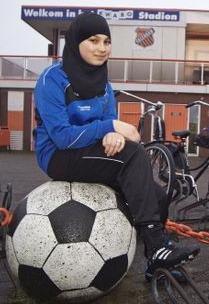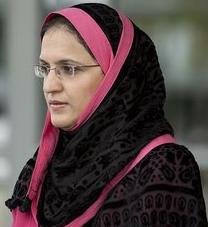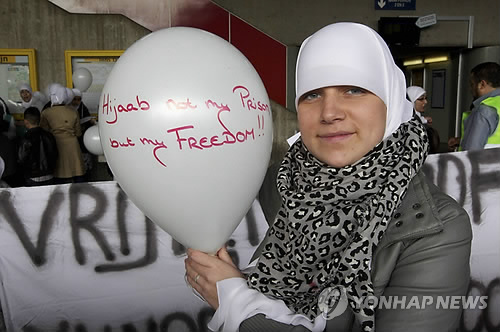The Berlin organisation ReachOut has launched a campaign to rescind the 2003 Law on Neutrality that opened the way for the German states (Länder) to ban the headscarf.
Category Archives: Hijab
Yasmin Alibhai-Brown’s ’16 reasons to ban the burqa’
ENGAGE replies to Yasmin Alibhai-Brown.
Dutch Catholic schools ‘can ban headscarves’ court rules
 Catholic schools are allowed to forbid Islamic pupils to wear headscarves. Such an item of clothing is in conflict with the Christian principles of the institution, which are protected by freedom of education, a district court in Haarlem ruled yesterday.
Catholic schools are allowed to forbid Islamic pupils to wear headscarves. Such an item of clothing is in conflict with the Christian principles of the institution, which are protected by freedom of education, a district court in Haarlem ruled yesterday.
Don Bosco College, a Catholic secondary school in Volendam, forbade a 15 year old pupil, Imane Mahssan, to wear a headscarf. The girl then took the school to court, but has now lost the case.
According to the judges, the headscarf ban fits into the Catholic character of the school, whereby different expressions of faith are not allowed. The judge considers that the headscarf ban does not restrict freedom of expression and that the school is not discriminating on the basis of religion.
Don Bosco College introduced the headscarf ban last September, a few months after Imane had made a request to wear one. Because the girl received no response to her request for months, she started to wear the headscarf.
Don Bosco College said the school may not have indicated any headscarf policy in response to Imane’s request, but it was already in the school rules that pupils must respect the Catholic basis of the school. This was of importance in the ruling by the Haarlem court.
Earlier, the girl’s case was in fact upheld by the Equal Treatment Commission (CGB). This advisory court only makes non-binding rulings, though the courts usually do adopt the CGB conclusions.
NIS News Bulletin, 5 April 2011
See also RNW which reports: “Geert Wilders, leader of the anti-Islam Freedom Party, has been quick to congratulate the school on the verdict. On Twitter he wrote: ‘A just ruling! I hope many Christian schools will follow this example’.”
Veiled Muslim women are under attack in the UK claims new research
Research into the experiences of veiled Muslim women is to be presented at a public event to be held at the University of Leicester on April 6.
Irene Zempi, from the Department of Criminology at the University of Leicester, is conducting postgraduate research into the victimisation of veiled Muslim women and their experiences as direct victims of Islamophobia in the streets of Leicester. With her in-depth qualitative research revealing the “hidden”, often “invisible” nature of Islamophobia, Irene will also identify ways to improve services and support offered to victims of anti-Muslim hate crime.
The research design employs interviews with female veiled victims. In particular, prospective research participants include British Muslim women who are descendants of immigrants from South Asia (in particular Pakistan, Bangladesh and India) and from other Muslim-dominated regions such as the Middle East, from African countries such as Somalia and Nigeria, as well as British converts to Islam.
Irene said: “My study is looking into the experiences of veiled Muslim women in order to raise awareness about the ‘true’ nature of Islamophobia that they face, and the consequences of the abuse and intimidation veiled Muslim women and their communities have to go through.”
“It is worrying that in a liberal democratic society such as Britain, Islamophobia is accepted and even expected. It is necessary to point out that Islamophobia is a new form of racism. As Baroness Warsi said in her speech at the University of Leicester about the ‘cancer of Islamophobia’: ‘When people get on the tube and see a bearded Muslim, they think “terrorist” … when they hear “Halal” they think that sounds like “contaminated food” … and when they walk past a woman wearing a veil, they think automatically “that woman is oppressed”‘.”
Irene highlights that public expressions of Islamophobia are invariably random in nature and so individual victims may be targeted when they are spotted in a public place such as streets, shopping centres, buses, and trains.
“Persistent staring, spitting, calling names, throwing of eggs or stones, and pulling women’s veils off are the overwhelming types of anti-Muslim hostilities, yet rarely reported to the police. As a result, this victimisation remains ‘invisible’ for police and local authority,” says Irene.
Fresh attempt launched to introduce anti-burqa law in Belgium
A committee in Belgium’s lower chamber of parliament approved Wednesday a law outlawing burqas and other kinds of Islamic face veils – relaunching efforts to introduce the ban nearly one year after they were thwarted by a government crisis.
The law seeks to punish anyone caught in public places with their face completely or partly covered – thus preventing their identification – with fines between 15 to 20 euros (21 to 35 dollars) and/or up to seven days’ imprisonment.
The draft law still needs to be approved by the full Chamber of Deputies and by the Senate, Belgium’s upper house.
A similar bill won backing from the Chamber last April, but was still waiting to be approved by the Senate when a linguistic squabble between Belgium’s French- and Dutch-speaking politicians led to parliament being dissolved, triggering early elections.
The bill was reintroduced by the centre-right French-speaking Mouvement Reformateur (MR), which stressed the need for a national law outlawing burqas after judges in January scrapped a local ban imposed in Etterbeek, a district of Brussels, the Belga news agency said.
Like last year, all other parties backed the proposal except for the French- and Dutch-speaking Green parties, which renewed calls for Belgium’s top administrative court to review the constitutionality of such a ban before it is introduced.
Via Islam in Europe
Is France right to ‘ban the burqa’?
Salma Yaqoob debates Yasmin Alibhai-Brown.
New York: 12-year-old charged with attack on Muslim schoolgirl
A Staten Island schoolkid has been charged with felony assault as a hate crime after he tried to rip the religious headscarf off a fellow female classmate, The Post has learned.
Osman Daramy, 12, allegedly attacked the victim today around noon inside the Dreyfus Intermediate School on Warren Street in Stapleton. He and a 13-year-old accomplice beat the girl up, punching and kicking her, before she fell to the ground, authorities said.
“Are you Muslim?” Daramy allegedly barked before grabbing at the hijab wrapped around the victim’s head. He was apparently unsuccessful in removing the covering.
Daramy, who has previously attacked the victim four times over a two-month period, was arrested, authorities added. He is also charged with aggravated harassment.
Cops were still seeking his alleged accomplice. Disciplinary against Daramy is pending, said a Department of Education spokeswoman.
Update here.
In a characteristically thoughtful contribution, Pamela Geller claims that Osman Daramy has been “charged with blasphemy”, because “‘hate crime’ is enforcement of islamic law (sharia)”.
Austria: Muslim women often victimised for wearing headscarves, report says
More and more headscarf-wearing women are becoming victims of racist attacks, according to an organisation’s annual report.
Civil courage and anti-racism institution ZARA said yesterday (Mon) it had been informed of 745 cases of racist abuses in Austria last year, around 50 fewer than in 2009. The organisation – which stressed that the actual number of offences is much higher – emphasised that the number of verbal abuses of devout Muslims wearing headscarves was on the rise.
ZARA explained Muslim women were experiencing difficulties applying for jobs in Austria if they are unwilling to remove the scarf during working hours. The organisation claimed these developments were primarily not based on racist tendencies among businesspeople, but their concerns that the number of clients may decline if a headscarf-wearing woman was hired.
Another aspect ZARA is emphasising in its 2010 report is “reckless” and often anonymous posting of racism-fuelled messages on social networking sites. The Vienna-based organisation said the fight against such actions was becoming more difficult since notes have often been read and passed on by many people before they get removed.
Muslims, Afro-Americans and members of the Jewish community in Austria are the main groups experiencing day-to-day racism in Austria, according to ZARA. The institution also criticised the country’s police for carrying out more so-called ethnic profiling in which black people and members of other minorities are being questioned and asked for their IDs only because of their origin and skin colour.
ZARA’s announcements come shortly after a poll revealed that fewer than one in five Austrians think of ethnic minorities as a group in need of protection. Magazine profil reported that just 18 per cent of Austrians think ethnic minorities deserve more protection.
The survey – carried out by research firm Karmasin – also showed that two in 10 Austrians said the same about migrants and asylum seekers. A meagre 13 per cent of Austrians told the pollster that religious minorities should get more protection in the country.
Another recent Karmasin survey revealed that, with 49 per cent, nearly one out of two Austrians consider asylum seekers as “generally dishonest”. Karmasin reported that a majority of 53 per cent agreed with the claim that people applying for political asylum in Austria “are more criminal than other social groups”.
Researcher IMAS found some months ago that 42 per cent of Austrians think immigrants receive more preferential treatment by authorities than themselves.
Via Islam in Europe
San Diego woman denied flight blames King hearings for rising anti-Muslim sentiment
 A San Diego Muslim woman wearing a headscarf who was removed from a Southwest Airlines plane at Lindbergh Field on Sunday has received several apologies from the airline and a voucher good for a free flight “as a gesture of goodwill”.
A San Diego Muslim woman wearing a headscarf who was removed from a Southwest Airlines plane at Lindbergh Field on Sunday has received several apologies from the airline and a voucher good for a free flight “as a gesture of goodwill”.
But the woman, Irum Abbasi, and the Council on American-Islamic Relations, an advocacy and civil rights group which has taken up her cause, said at a Wednesday morning news conference at Lindbergh Field that this event is a sign of a anti-Muslim sentiment spreading through the country.
A Pakistan native and U.S. citizen, Abbasi was removed from a flight to San Jose on Sunday after an attendant thought she heard her say “It’s a go” on her cell phone. Abbasi said she actually said “I’ve got to go” because the flight was ready to depart.
“I was in tears,” said Abbasi. “I have lived in the United States 10 years. I am a U.S. citizen.” While she was quickly cleared, Abbasi said she was told she could not re-board the flight because the crew was uncomfortable with her presence.
Abbasi and CAIR both link her ejection to last week’s controversial congressional hearing on “The Extent of Radicalization in the American Muslim Community” by Rep. Peter King, R-New York.
“Apart from the negative image it portrayed of the Muslim community in front of all the people at the airport, I strongly believe that this was a direct result of the hearings held by Peter King,” said Abbasi, a graduate student in experimental psychology at San Jose State who was returning there for a research project.
Belgian department store worker to take legal advice over headscarf ban
 After being refused an extension of her contract because she wore a headscarf to work, an employee of Hema last week turned down a new job offered by the Dutch-owned retail chain. Antwerp-born Joyce Van op den Bosch, 20, said the new offer was not satisfactory.
After being refused an extension of her contract because she wore a headscarf to work, an employee of Hema last week turned down a new job offered by the Dutch-owned retail chain. Antwerp-born Joyce Van op den Bosch, 20, said the new offer was not satisfactory.
“This is not my old job as a saleswoman; here I have to stay in the warehouse. I won’t be accepting their offer,” she said. In addition, the contract was temporary and part time, while Van op den Bosch had been promised a full-time job.
Van op den Bosch had been employed by Randstad as temporary staff in the Hema store in Genk, where she lives. When her contract reached its end and was not renewed, she was told there had been customer complaints about her headscarf. According to a spokesman for Randstad, wearing a headscarf was “not in conformity with Hema’s company dress code”. Her contract was not renewed, he said, because she had declined to comply.
At the beginning of her employment, Van op den Bosch had asked if wearing a headscarf was acceptable, and she was told it was. She was even provided with a Hema headscarf, as worn by staff in the Netherlands. That went on for two months, then came “many negative reactions” from customers, according to Hema spokesperson Inge Van Baarsen. The company declined to say how many complaints were received.
In a statement, the company made an unusual claim: “Since in Belgium is it not customary to wear a headscarf in a public place”, Hema decided to ask Van op den Bosch to stop wearing the headscarf, which she declined to do. “We wish to stress that this decision is not connected to the wearing of a headscarf as such, but that it applies to any outward appearance which is not in keeping with the neutral and discreet image of Hema,” the statement said.
However, Jozef De Witte, director of the Belgian Centre for Equal Opportunities and the Fight Against Racism, said that the case appears to be discrimination. The temp agency cannot discriminate among their staff on the basis of the complaints or prejudices of a client – in this case Hema. Unless the store cancelled its contract with Randstad as a whole, it would be guilty of discriminating against one member of staff.
Randstad later admitted it had misgivings about the question of discrimination against the wearing of a headscarf and had applied earlier this month to the Centre for Equal Opportunities for advice. The centre said a headscarf was in most cases not a significant item of business clothing and so could not be grounds for dismissal. Randstad later said it could not take the centre’s advice, since a number of employment law experts disagreed.
Last weekend, Hema issued the statement: “By permitting the wearing of a headscarf and later withdrawing permission, Hema behaved unfairly towards the temporary employee. Internal rules for work clothing have now been refined, central to which is that staff should be as neutral as possible in the view of the public.”
For Van op den Bosch (pictured), nothing is decided. “This week on Wednesday I have an appointment with my lawyer,” she said. “Then we’ll know where everything stands.” Also last weekend, about 300 people took part in a demonstration organised by supporters of the right to wear a headscarf.
Meanwhile, the controversy over the headscarf was also revived again at the federal level after a member of staff of the socialists appeared in parliament wearing one. N-VA called for a ban on the display of all religious symbols in parliament, a position supported by French-speaking liberals and the far-right Vlaams Belang.
Last year Jan Peumans, N-VA speaker of the Flemish parliament, reprimanded Vlaams Belang’s Filip Dewinter after he called for the expulsion of a woman wearing a headscarf in the public gallery.
